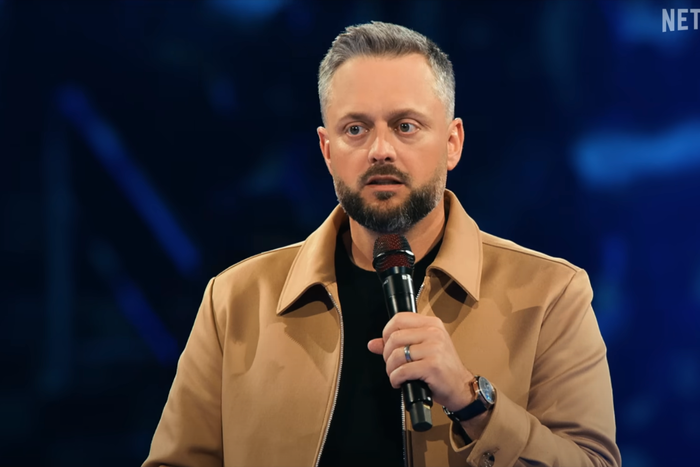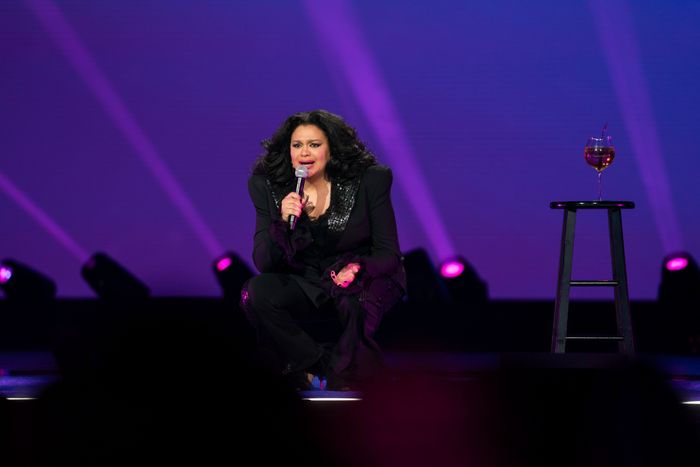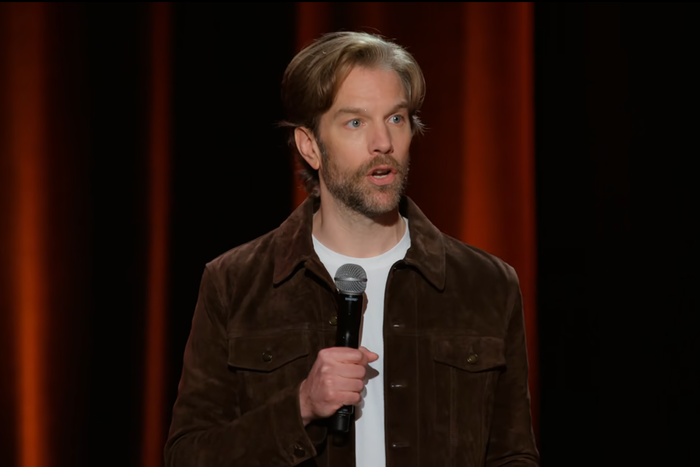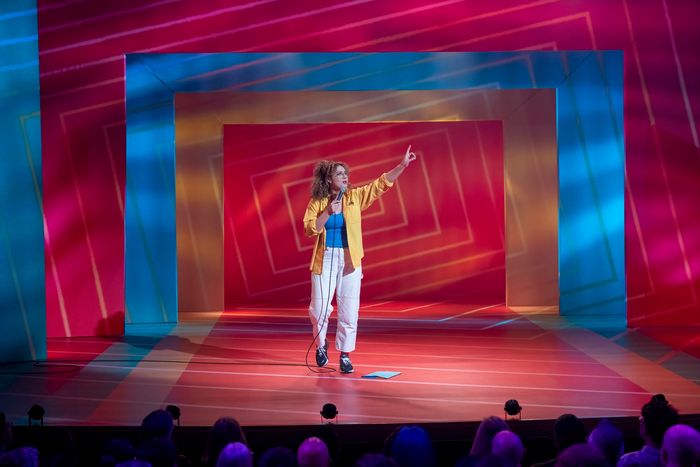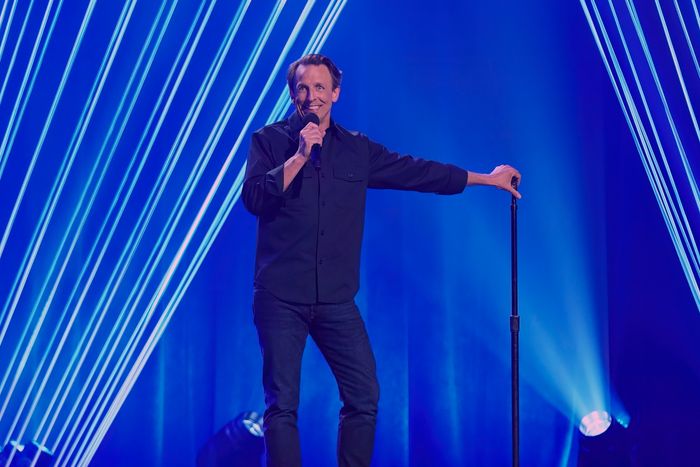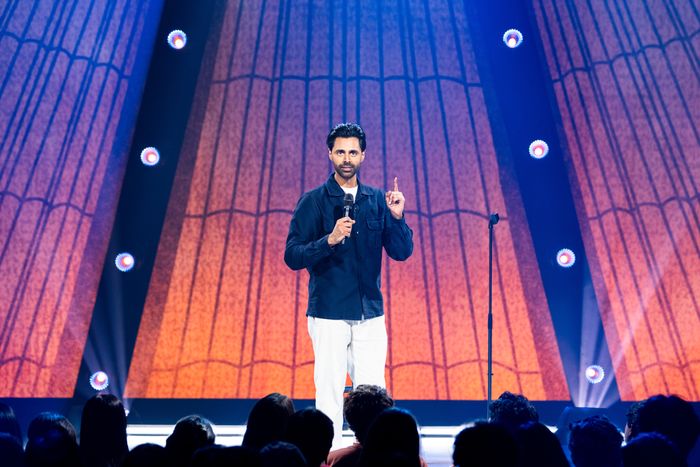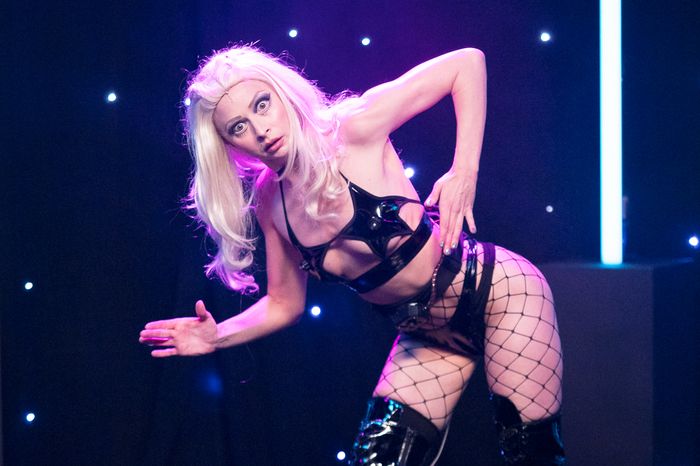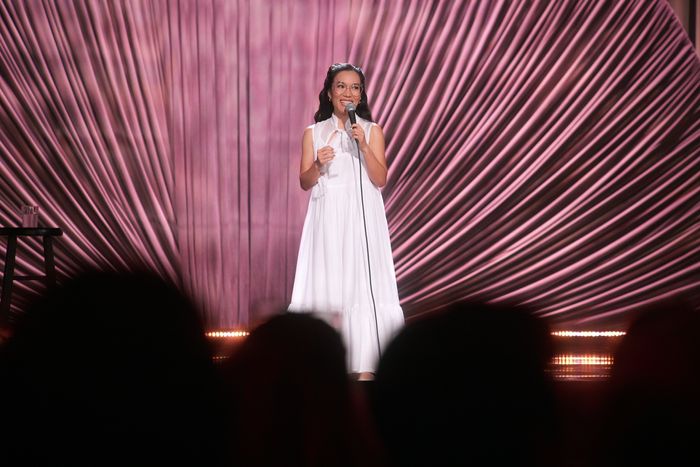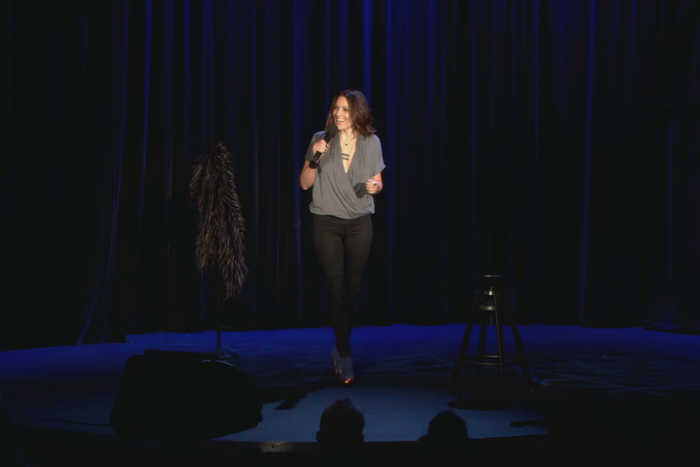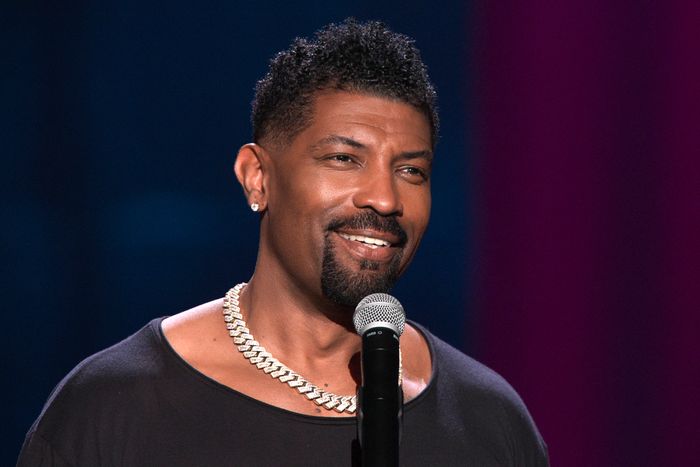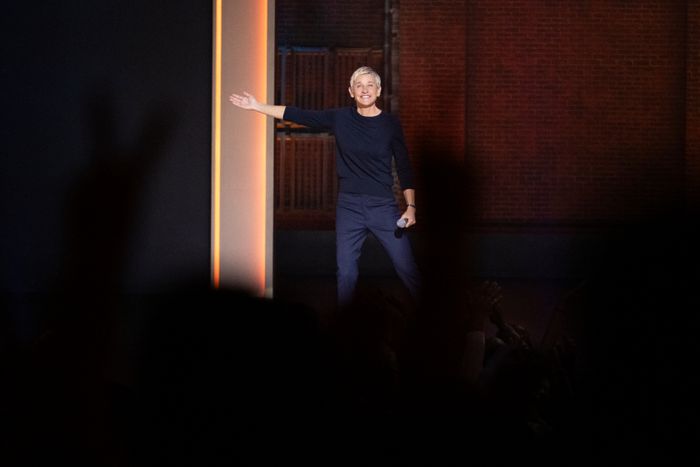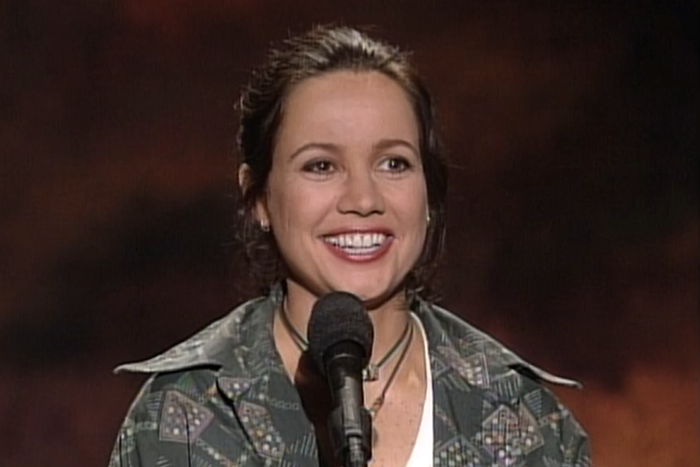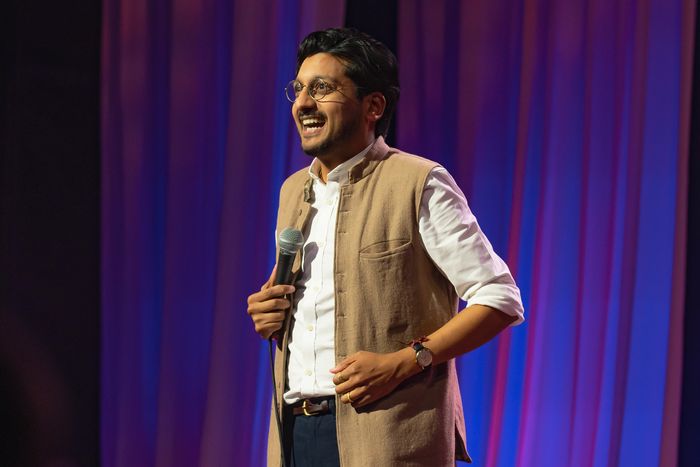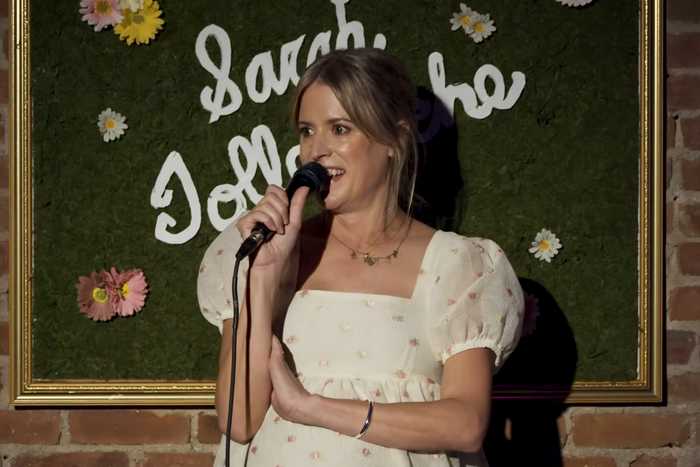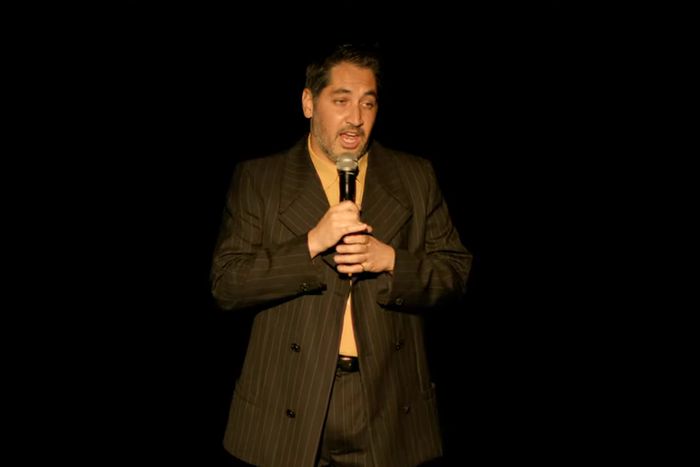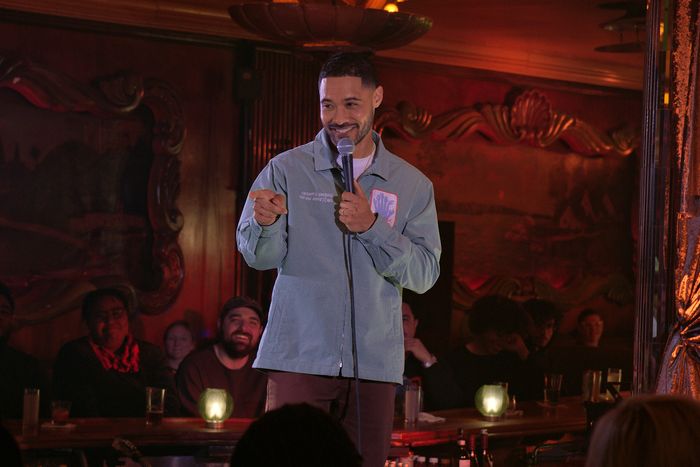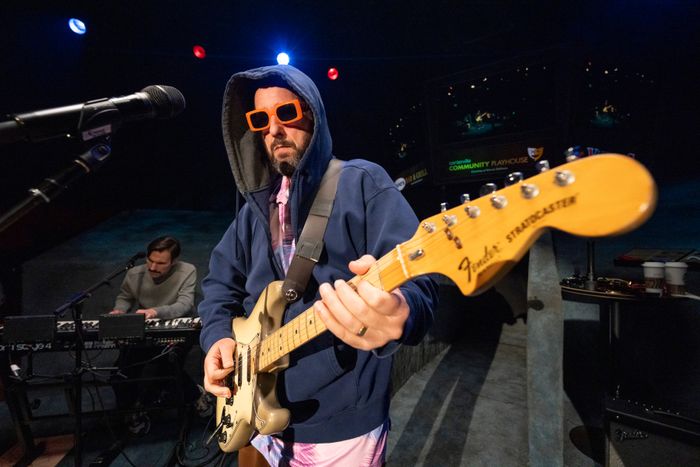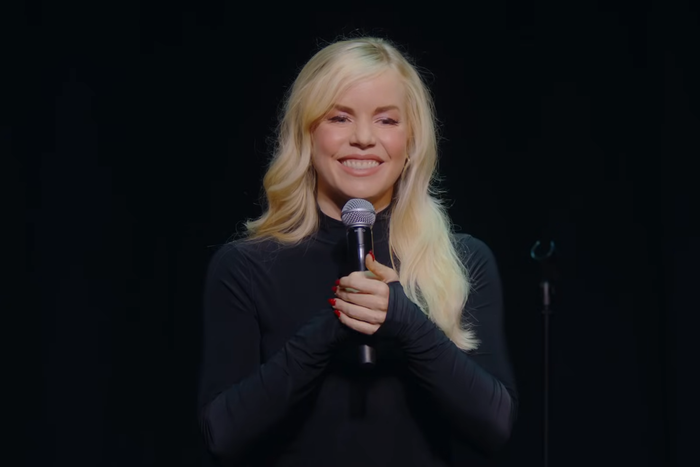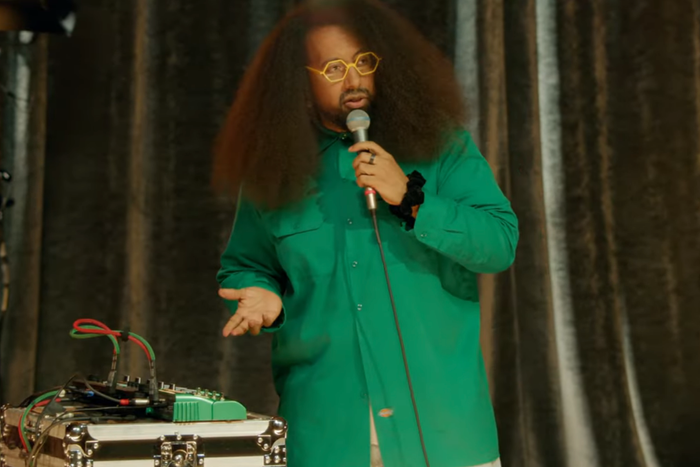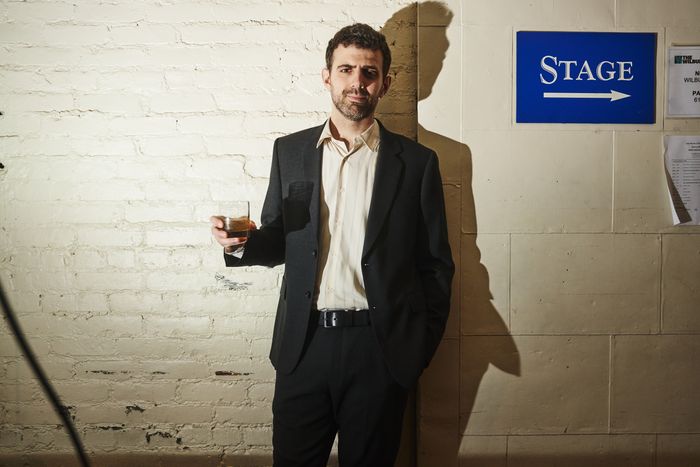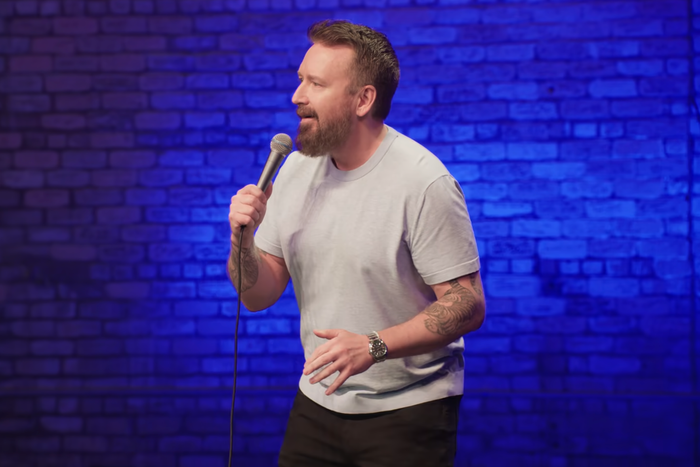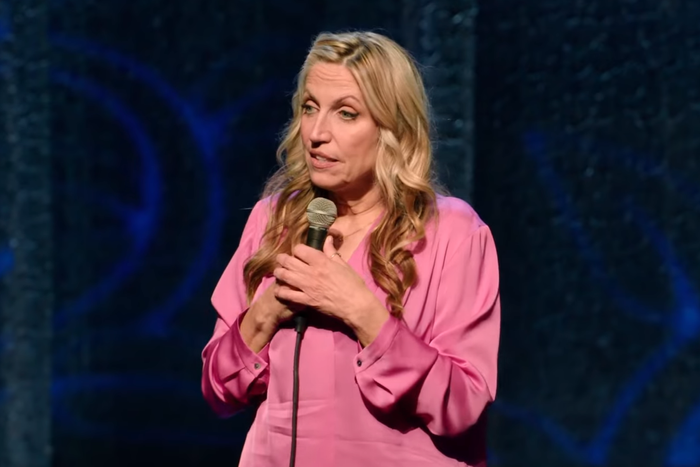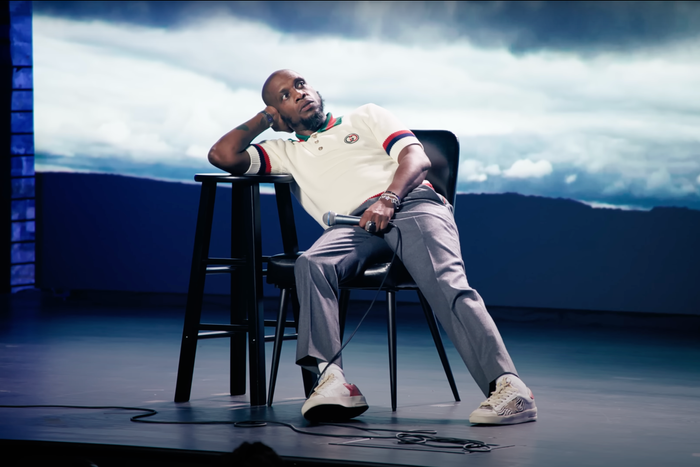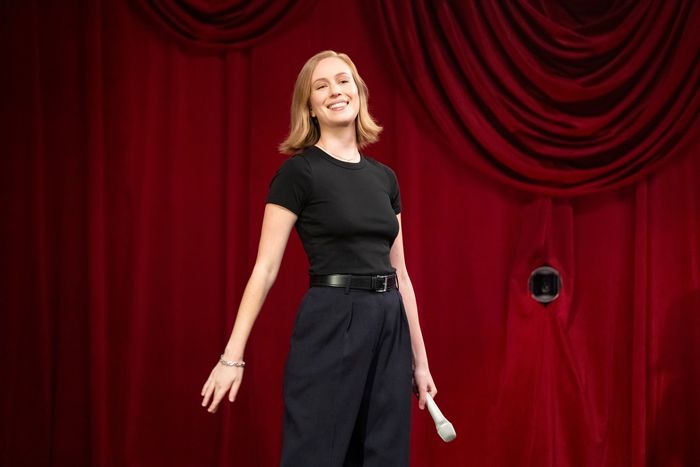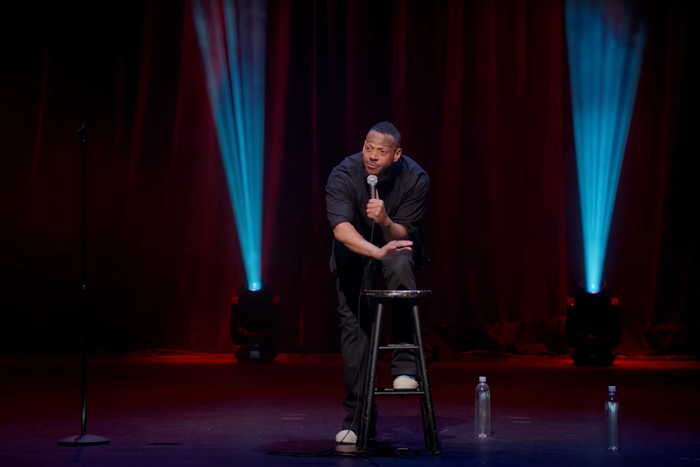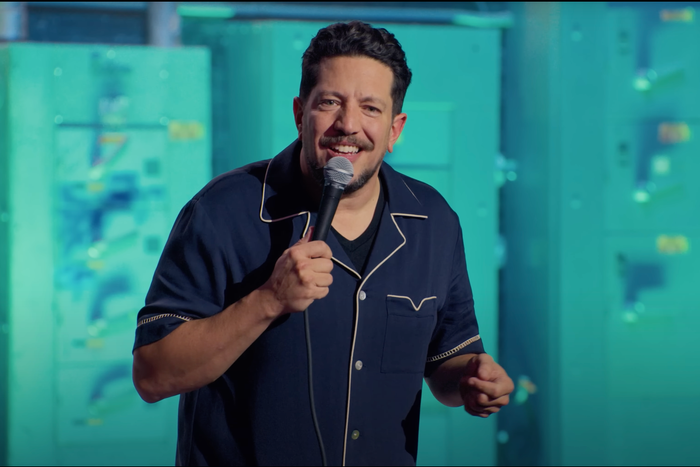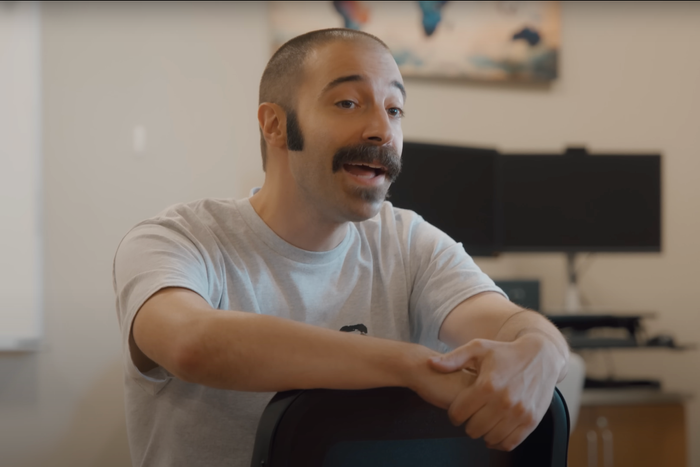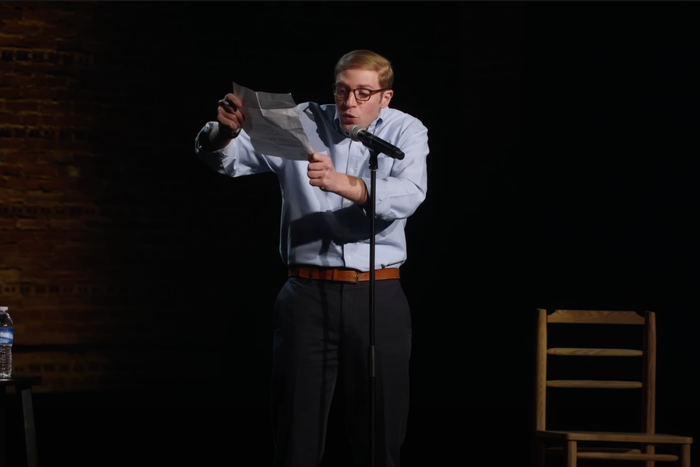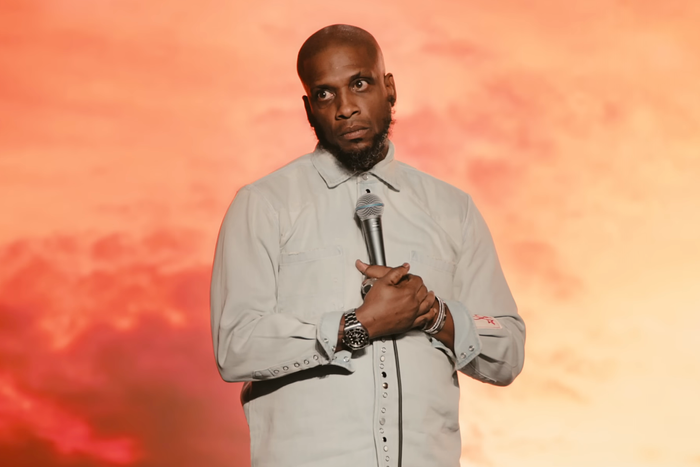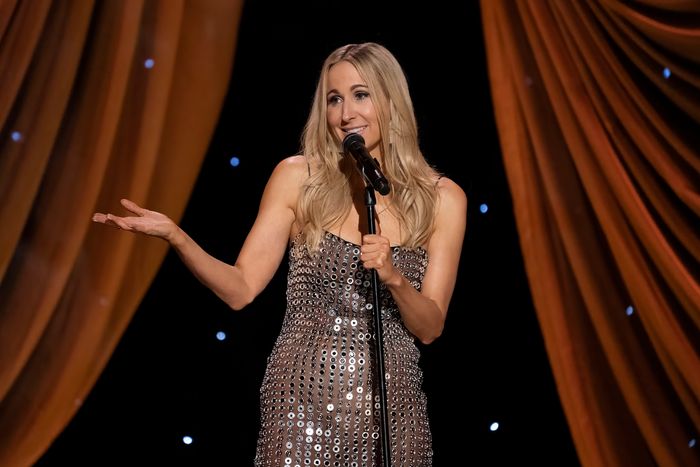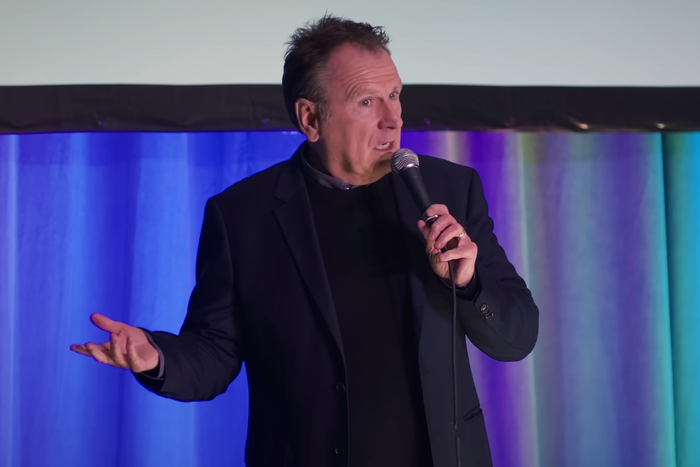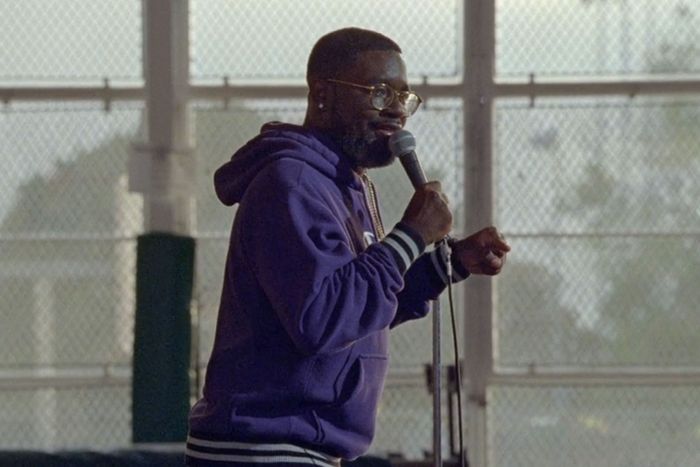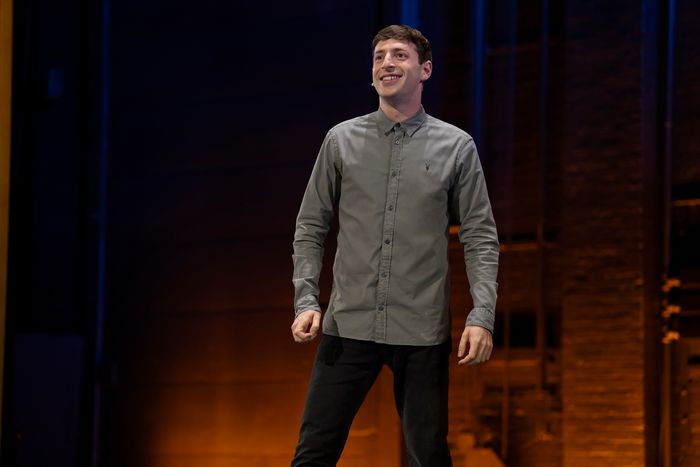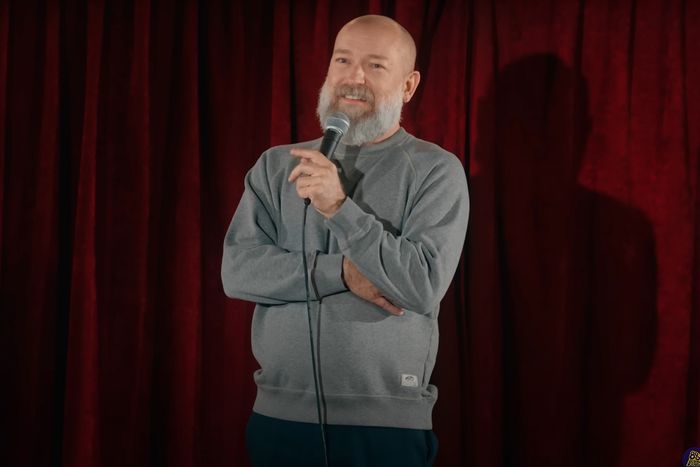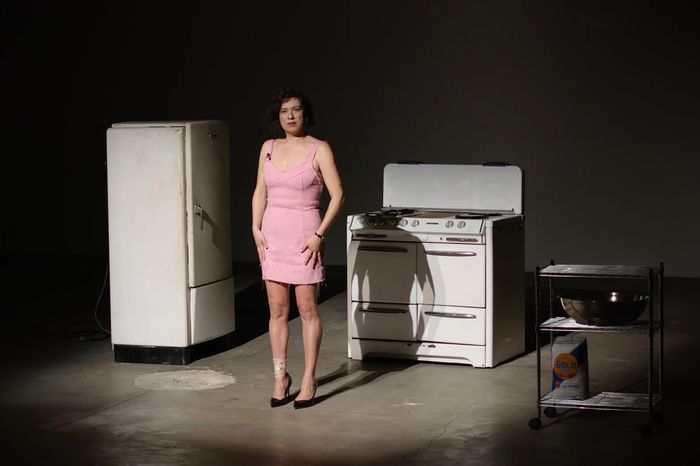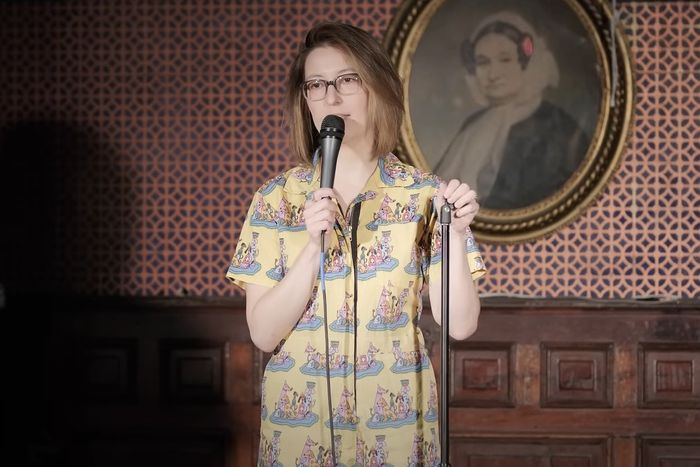
Upward of 150 stand-up specials were released in 2023. That’s a lot — much more than a generation ago, when it was hardly guaranteed that a comedian would ever film one if they weren’t one of the top names in the business. Now, if a comedian can’t get one of the cable or streaming networks to buy their special, they can self-produce and release it alongside one of the hundreds of other specials currently on YouTube, which only makes the glut of options for viewers daunting. As such, every month this column will suggest a few specials worth watching: three to five released in the given month and, when warranted, an older special that feels in line with one or more of the new releases. Think of this not as a “best of” list but a collection of specials that are funny, ambitious, compelling, or peculiar — not necessarily all four at the same time, but each has something that makes it extraordinary. We can’t change the enormous amount of options out there, but we can elevate the ones that are noteworthy watches for any stand-up fan.
Nate Bargatze, Your Friend, Nate Bargatze (Netflix)
Historically, no comedian plays arenas without losing a part of themselves to fame, money, and lack of relatability, but as his profile has grown, Nate Bargatze’s output has only gotten stronger. While it would previously be easy to dismiss him as just some dumb guy talking about times he was dumb, Bargatze has recently begun to tap into something more fundamental about living in the information age — specifically, the struggle of feeling like you don’t know anything despite hypothetically having instant access to all knowledge at all times. In Your Friend, this materializes in a more fleshed-out version of his first SNL monologue, in which Bargatze conveys the befuddlement of going from growing up in the 20th century, when he saw animals perform stunts at the county fair, to now living in the future. “I don’t know what AI is,” he says. “I don’t think you get to know what AI is and also see a donkey jump off a high dive. I think it was one or the other, and I saw the donkey, so I’m out.” The special is not explicitly about any one idea or topic, but there is a clear thematic through-line that gives the hour cohesion without ever feeling heavy. Add to that a lack of curse words or sexual content, and it’s hard to think of a better special for the whole family.
Michelle Buteau, A Buteau-ful Mind at Radio City Music Hall (Netflix)
Midway through her newest special, Michelle Buteau calls out Dave Chappelle by name and “GOAT” title (“He is the GOAT, if that means Going Off About Trans people”). Buteau is clearly aware that her special is on the platform most associated with Chappelle, and at a venue associated with him, Radio City, where he performed multiple residencies as part of his “comeback” over a decade ago. But the moment is not tossed off; it reflects the core mission of Buteau’s stand-up and this special, which she believes is antithetical to Chappelle’s work. “I can’t believe somebody would make millions and millions of dollars for making people feel unsafe,” she continues. “I wanna make millions and millions of dollars for making people feel safe, seen, secure, heard, and entertained.” And that’s what Buteau does. For example, the joke that leads into the Chappelle callout is about her learning that her Black lesbian friend uses a Theragun as a vibrator and responding, “Girl … You like to get your pussy beat up like that?” She and her friend go back and forth, and Buteau is skilled at writing and performing the story so you feel the love between them. There are few comedians who have this much fun onstage and are able to translate that fun to both the live audience and the audience watching later.
Ronny Chieng, Love to Hate It (Netflix)
Love to Hate It opens with nearly 20 minutes of Chieng recounting his perspective on going through the IVF process with his wife. It is by far the weakest part of the entire special; even if the material is autobiographical, it’s not particularly enlightening. (It doesn’t help that the male perspective on IVF, and especially the “masturbating in a cup” part, is well-trodden.) Chieng transitions from the idea of becoming a father to the pursuit of being a better man, which opens up a section about how a generation of men in search of self-improvement have been completely ruined by algorithms. At this point in the special, I thought to myself, Okay, now the show is really starting. “It’s very tragic,” the section starts. “All those people, they were just trying to lift weights. They weren’t trying to cause an insurrection. They didn’t even know what that word meant!” Chieng has always been skilled at discussing big tech in his stand-up, but this chunk feels especially revealing after an election in which the online viewing habits of young men became a key issue. After the reelection of Donald Trump, there will surely be debates about the value and/or limitations of satire, but Love to Hate It will expand your thinking on a number of issues and offer the unique catharsis of watching an angry person scream about what you are also angry about.
Anthony Jeselnik, Bones and All (Netflix)
In 2019, Anthony Jeselnik performed a set at Comedy Central’s Clusterfest that included a ten-minute story about his friends asking if he’d be their sperm donor. That story appears in Bones and All as just: “One of my friends just asked me if I would be the sperm donor for her baby. I said, ‘I don’t know. That’s a pretty big decision … How old is your baby?’” Jeselnik is not just some one-liner comedian who spends years trying to shave syllables from every joke like they’re word puzzles. Instead, he packs his comedic perspective into the most concentrated dose possible to maximize its impact. On display in Bones and All is complete mastery of dark joke writing, but Jeselnik no longer needs to prove he’s better than all the other comedians trying to produce “edgy” work. Instead of looking toward others, Jeselnik could grow by turning inward — not in the traditional sense of more personal material (though that is an option), but by shifting his ambition from technical prowess to originality. Bones and All may be the year’s best hour of joke writing, but at this stage in Jeselnik’s career, I want more of him.
Rose Matafeo, On and On and On (Max)
There is a joke in On and On and On that perfectly captures the dichotomy that is Rose Matafeo, the 32-year-old New Zealander comedian best known for creating and starring in Starstruck. It is about how she doesn’t like the concept of “romanticizing your own life” she’s seen discussed online by the younger generation. Like, for example, if they were making a cup of tea, they’d make it cutely: “Maybe you could do a little doily … Or you can make it in a little antique teapot, from fucking 1998 … Or maybe you can wear a little nightgown while you do it, so you’re a little fucking Victorian ghost or some shit.” And yet, she screams, “I fucking know whimsy! I grew up in the 2010s!” Matafeo is proudly a member of the Amélie generation: “Amélie to women my age, she’s our Travis Bickle.” See, Matafeo is one of the world’s quirkiest yet most rageful comedians — she’s like Julio Torres doing Bill Burr, or Lewis Black doing Kristen Schaal. One caveat: Matafeo works in the British style, which means her performance can feel a bit detached at times; she projects her material instead of talking it out in a more conversational manner. There are also a few dramaturgical choices in the special that may appeal to viewers who like one-person shows but may come across as both clichéd and ham-fisted to others.
Previously Featured Specials:
Rachel Bloom, Death, Let Me Do My Special (Netflix)
There have been a lot of jokes made by comedians about the pandemic — to the point that topics like masks, toilet paper, vaccine jabs, and the banging of pots and pans are now hack. And there have been a lot of specials made by comedians fulfilling deals they made before the pandemic. But most have only briefly referenced this time in history’s most defining aspect. I’m talking about death. And to Rachel Bloom’s credit, in Death, Let Me Do My Special, she does talk about death. She even sings about it. In fact, the special is about grappling with the inability to make lighthearted jokes or deny death when it perpetually surrounds us.
Bloom begins the show as if she’s doing a typical stand-up routine before being interrupted by Death, played by David Hull (known for his role as White Josh in Crazy Ex-Girlfriend). The special unfolds as a back-and-forth where Bloom shares personal reflections — like her sadness over the fact that her dog will die one day — in an attempt to return to “normal” comedy, only for Death to nudge her to go further and deeper. At one point, Death sings a song comparing himself to Evan Hansen, which is arguably the comedic high point of the special. This builds to Bloom discussing the death of her friend and collaborator, Adam Schlesinger, from COVID early in the pandemic. The moment is tough, and she beautifully lets it be tough. The show’s pacing has some issues, especially with the “this happened, then this happened” style of storytelling that might have benefited from a couple more years of refinement. Despite its flaws, its willingness to take on a weighty topic ambitiously is impressive among many post-pandemic releases by comedians who merely phoned it in so they can move on from that time.
Seth Meyers, Dad Man Walking (Max)
Welcome to the 2024 HBO Roast of Seth Meyers’s Whole Damn Family. No one is safe — not his vegan brother, mean wife, or three kids who are so freaking bad at rolling dice it makes him want to scream. And it works, because like any great roast comedian, Meyers is excellent at crafting jokes. Meyers, primarily an improviser early in his career who didn’t start performing stand-up seriously until a few years into anchoring SNL’s “Weekend Update,” is so skilled at joke writing that it seems likely some stand-up lifers and road dogs would resent him. Dad Man Walking features precise and evocative one-liners such as “The best thing about my in-laws is that they are very easy to find. If you’re ever looking for them, they are in the middle … of my fucking business,” and “My wife’s caffeinated beverage of choice is a matcha latte. If you don’t know what that is, I’ll tell you what it’s not: available at the coffee place you are going to.”
Meyers most shines in the Mulaney-esque way he builds premises into mini-sketches that allow the audience to picture the setting and characters. For instance, he turns the simple story of giving his son a timeout for biting his other son into a French New Wave parody. Or there’s his story about appearing on Finding Your Roots as a not easily impressed person (“Well, I mean, I knew I came from people”), which would have made a fantastic pitch for Nate Bargatze’s Saturday Night Live episode.
Hasan Minhaj, Off With His Head (Netflix)
Hasan Minhaj is in his Reputation Era. The strident, NBA-referencing, one-person-show cornball earnestly looking directly into the camera is dead, and in his place stands a bad-little-boy club comedian in Off With His Head. There are still NBA references, but the jokes are edgier. Take, for example, a run about men of his generation who don’t read but listen to podcasts and text him alpha-male memes saying things like “mamba mentality”: “If Kobe [Bryant] knew you were quoting him, he would put you in a helicopter and crash that shit himself.” While it’s a bit structurally strained, the joke reflects Minhaj’s new willingness to polarize his audience. He no longer feels the need to be a safe option for networks looking for their next potential talk-show host.
In Off With His Head, Minhaj essentially trades one form of truth telling for another, replacing autobiographical narrative for “I’m the only one saying how things really are.” Yes, it’s a cynical calculation: If he’s going to lose Jon Stewart–revering New Yorker readers, he needs to build an audience of traditional media-distrusting cord cutters more likely to get their news on YouTube. And it works — partly because it’s a special about him, and a portion of his fellow first-generation South Asians, being cynical and calculated. After seeing on social media how many people dislike him, Minhaj, who once thrived on approval, now showcases his unlikable sides. And there is something more true — sorry, emotionally true — about that.
Courtney Pauroso, Vanessa 5000 (Dropout)
While clowning has gained prominence in the L.A. comedy scene, little of it has been filmed. For years, the shining example has been the 2020 Netflix special Nate, in which Natalie Palamides plays a lovable dirtbag grappling with post–Me Too masculinity. Courtney Pauroso, a close collaborator of Palamides, builds on this theme with Vanessa 5000. While Palamides desexualizes her body — she performs mostly shirtless, with chest hair stupidly drawn on in black marker — to offer a unique angle on consent, Pauroso takes the opposite approach, hypersexualizing herself as a sex robot. Her character confronts her audience, both literally (at one point, she consensually spits in someone’s mouth) and philosophically, exploring how sexual desire is used as a Trojan horse for data harvesting and consumerism as well as how technology has disrupted what it means to be human. The performance is both profound and profoundly stupid. For years, Vanessa 5000 shows included a sexy dance to a Nine Inch Nails song to showcase Pauroso’s “sex robot” merit, but in the special, due to music-rights issues, she dances instead to a Weird Al–style parody of Nine Inch Nails with the lyric “I want to doink you like a dinosaur.” As a whole, the special is a captivating mix of smart and dumb, sexy and gross, shocking and touching.
Ali Wong, Single Lady (Netflix)
Ali Wong’s last special, 2018’s Hard Knock Wife, ended with her recalling a time in her past when a man enthusiastically had sex with her during her period, followed by her declaration that she no longer makes jokes about performing oral sex — because she stopped doing it after having a baby. These moments illustrate what made Hard Knock Wife a bit of a letdown after Baby Cobra: Wong didn’t seem to have fresh material she was eager to share (or overshare). What a difference a divorce makes. Even more so than Baby Cobra, Single Lady is Wong’s most present special, filled with stories that crackle with the excitement of recency. It’s wall-to-wall stories of sexual experiences as a newly single woman; consequently, she once again has fresh insights on oral sex. A bit about how rude it is that “a lot of men refuse to kiss after they’ve cum in your mouth” moves directly into a joke that starts with her saying, “You don’t have to give me head day one of my period, but when we have landed on day four … and it has petered out into a watery salsa …” While she is not the best at punch-line writing, Wong is exceptionally skilled at taking strong, distinct angles on risky premises and pushing them much further than anyone else in comedy — or at least anyone as famous as she is.
James Adomian, Path of Most Resistance (YouTube)
On YouTube, surrounded by impersonators rattling off different Family Guy characters going to Taco Bell or whatever, James Adomian stands apart as a true impressionist. Like all his work, in Path of Most Resistance, he brings subjects to life with a clear comedic perspective. When he imitates someone like Alex Jones, his voice paints a complete picture of him: red-hot, dripping with sweat and his own spit. In the special, Adomian’s vocal gifts are showcased in a masterful bit about airplane rewards programs. It’s a well-worn topic, but in his hands it becomes an allegory for the constructed nature of class. He inhabits both the rewards members and airline employees responding to them, becoming more and more haughty as the status rises. Throw in his beloved Bernie Sanders impression and this seven-minute joke features upwards of ten distinct voices.
Unbelievably, this is Adomian’s first stand-up special. His 2012 album, Low Hangin Fruit, was a big deal for those closely following alternative comedy at the time. But over the past decade, comedy consumption has become increasingly on-demand-special-focused, leaving many comedy fans to be unaware of that record and its breakout bit, “Gay Villains.” That said, the benefit is that Path of Most Resistance is uncommonly realized for a debut special.
Deon Cole, OK, Mister (Netflix)
Like Degas, Deon Cole makes art with a narrow focus that allows for greater depth of personal expression. But instead of ballet students, Cole’s muse is women — specifically “vintage women,” his name for women of a certain age, which is essentially his own age (52). OK, Mister features a little over an hour of observations about dating when getting older, and by limiting his palette, Cole makes more room for his specific voice. For Cole, who wrote for Conan for three years, women, dating, and sex are sturdy premises for silly flights of fancy. In one section, he explains why he doesn’t date women with big butts: “The amount of toilet paper they use is ridiculous.” He continues, “I had just put out a fresh roll, right? Like still-stuck-to-the-other-toilet-paper fresh. This motherfucker was at my house all of three hours. When she left, it was just cardboard spinning in that motherfucker … I caught her one day just wrapping her shit. [Pantomimes wrapping his hand.] ACE bandage style.” When some comedians get more famous, their material suffers because they become too rich to write relatable jokes. But mostly everyone dates or, at least, has dated, and everyone knows what it’s like to find an older person at a party attractive. The only difference is, for Cole, it was Angela Bassett.
Ellen DeGeneres, For Your Approval (Netflix)
For better and worse, Ellen DeGeneres’s greatness is on full display in For Your Approval, touted by the comedian and Netflix as the final special of her decadeslong career. The upside? The special features some really good and varied jokes that blend old-school observational humor with understated whimsy. DeGeneres has one of the most distinct and influential voices in stand-up history, and she and her writers (Ian Karmel is credited as a consulting producer) are locked in for this hour. One standout joke involves her ADD and struggle with reading: “Moby-Dick, for me, is two pages about a whale,” she starts, “and 425 pages about me wondering if I should grow my hair out or keep it short.” Then DeGeneres pushes it further with a classic act-out, pantomiming herself reading while debating her hair length under her breath. It’s the kind of quiet bit that few comedians can pull off at this scale.
The downside? A full 12 minutes of the special are spent by DeGeneres simply smiling while her audience claps for her, so whatever self-awareness or maturity she tries to convey is overshadowed by a sense of self-congratulation. Plus, the frequent audience-applause breaks ruin the momentum for viewers at home. At best, her director and editor failed her; at worst, she wanted to show just how many people think she’s great. It’s worth watching — but maybe while you’re cooking dinner so you don’t notice the constant interruptions.
Ahir Shah, Ends (Netflix)
Ahir Shah’s Ends won the Best Comedy Show prize at the 2023 Edinburgh Fringe Festival, making it a great entry point for anyone curious about that genre of stand-up. I say genre because while an Edinburgh show can be anything — clown, cabaret, traditional stand-up, sketch — there’s a common structure in the festival’s stand-up shows. To be reductive, they tend to be autobiographical single narratives tied to a contemporary issue, where the first two-thirds are lighthearted and loose, and the final third turns serious and emotional. A British comedian told me the long-running joke at Edinburgh is “at the 40-minute mark, the comedian’s dad dies.” Not to spoil it, but all of this is very much in play with Ends. Shah uses Rishi Sunak’s rise to prime minister in 2022 as a springboard to tell the story of his grandfather’s immigration to England, exploring what progress looks and feels like for South Asians in the U.K.
There’s an admirable ambition in trying to tackle ideas of sacrifice, immigration, assimilation, and loss while also making the case for why the rise of a conservative politician Shah generally despises might be seen as progress. Shah is a captivating performer, speaking at a breakneck pace typical of British comedians but with more passion and clarity. To American ears, the theatrical nature of British stand-up might make Shah’s presentation feel impersonal, like it’s missing the hard-hitting jokes we expect even from storytelling comedians. Nonetheless, it’s hard to finish the show without feeling moved and a bit provoked.
Sarah Tollemache, B*tth*le Money (YouTube)
B*tth*le Money is a YouTube special — not just because it was released there but because it feels right at home there. Unlike overly polished specials shot in some old ornate theater, B*tth*le Money is shot very plainly at Grove 34, the club closest to where Tollemache lives in Queens. It’s a perfect match for Tollemache’s low, casual energy; she doesn’t shout punch lines to the back of the house so much as shrug them toward the front row.
A lot of times, comedians say onstage that they have depression, but it doesn’t feel real when they’re running around like a clown. But with Tollemache, who mostly just sways a little, you believe it. And there is something captivating about how casual she is. In one moment, toward the end of the special, a joke about falling in love with her husband’s sex doll flops. She acknowledges it needs some work but that she’s going to keep it in the special anyway “because this is YouTube … Whooo cares? They probably stopped watching after 20 minutes.” Her demeanor lulls the viewer, so when she delivers her more developed jokes, they hit harder. Case in point: The special’s titular bit about how the amount of money people are making on OnlyFans means that, in the future, “we’re going to have trust-fund babies who are from butthole money,” which, for my money, is the best joke of the month.
Carmen Christopher, Live From the Windy City (Veeps)
Along with frequent collaborators Joe Pera and Dan Licata, Carmen Christopher portrays fictional characters onstage rooted in his own personality. The thrill and intrigue of watching these comedians often comes from the mystery of who they “really” are. (Conner O’Malley also works in a similar style but leans more toward the satirical than the personally revealing.) In Live From the Windy City, Christopher comments on the misconception that people from Chicago are nice, saying, “The last time I was home for Thanksgiving and Christmas to visit my family, I spent twelve hundred dollars on flights to hang out with the rudest people in the country.” He adds, “But my family does have one Christmas tradition: We all go around the dinner table and say one nice thing about …” he pauses, then points his finger for emphasis “… Mark Wahlberg.” Christopher also breaks from the traditional stand-up format of simply talking into a microphone. In Windy City, he tells a long story accompanied by a series of music drops and playful lighting, then performs a scene with audience members that eventually features him speaking in voice-over. These experiments never feel like gimmicks, because there’s an underlying current of truth and heart that runs through Christopher’s act.
Langston Kerman, Bad Poetry (Netflix)
John Mulaney felt motivated to direct Langston Kerman’s debut hour special because Kerman reminded Mulaney of what it felt like before releasing his own debut hour, New in Town, in 2012: “Everyone knows he’s a good stand-up, but he’s got a great hour that’s got to get out.” There are structural similarities between the two comedians; both seamlessly pair well-crafted premises with sketchlike act-outs. The difference lies in their performance styles: Mulaney is a more energetic performer, while Kerman, a former poet, relies more on language. His word choices create a sense of physicality that compensates for his relative stillness onstage. For example, in a run about what he wants to say to someone who gives an underwhelming response to seeing a photo of his baby, he says, “No, bitch. She’s an effervescent beauty. I think you meant to say her cheeks remind you of the clouds that wrap around mountaintops. Tell me she makes you feel like the warmest day in winter. Say you want to kiss her, softly. Slowly. That’s right. You a pedophile for my baby. You going to jail, you sick fuck. ’Cause you wanna Joe Biden–sniff my baby.” Bad Poetry has an advantage over New in Town because Kerman is considerably older than Mulaney was at the time and uses the special to explore larger ideas. The hour primarily revolves around whether having a baby is the best thing that ever happened to him. The counterargument begins with running into Forest Whitaker at an IHOP and only intensifies from there.
Matt Rife, Lucid (Netflix)
If there have to be crowdwork specials — and, seemingly, there has to be — then Lucid, Netflix’s second crowdwork special, offers some noteworthy elements worth paying attention to. But first, it must be acknowledged that nearly every joke Rife attempts is bad. He’s quick on his feet, but his responses often are knee-jerk. For example, he asks the audience if anyone feels like they missed an opportunity to pursue a dream. A man in a blue T-shirt responds, “If I was a girl, I wanted to be a pole dancer.” Rife turns to another audience member he had spoken to earlier and says, “I’m sorry that I called you gay.” He points to the blue T-shirt man. “That’s gay.” Despite this, Rife excels at creating an environment where the crowd feels comfortable sharing some really wild secrets. He establishes the special’s theme at the top — dreams, both the professional and nighttime kinds — then expresses earnest support for what everyone offers him when called on. (He reminds blue T-shirt man, for example, that male pole dancers exist.) The warmth of Rife’s connection with his audience is emphasized by director Erik Griffin, himself a comedian. Griffin lights Rife and his audience the same way, and rather than passing around a handheld microphone, the entire crowd is miked. Thanks to this approach, Lucid feels less like a comedian farming his audience for content as it does a shared experience.
Adam Sandler, Love You (Netflix)
The Josh Safdie–directed Love You opens in chaos and anxiety. Adam Sandler arrives at the venue for the taping, instantly overwhelmed by problems and obligations: His windshield cracked, his shirt is stained, a stranger wants him to FaceTime with an injured relative, and there are countless pictures and Happy Gilmore jerseys to sign. But when Sandler takes the stage, there’s relief. This dynamic of tension and release continues throughout the show, with Sandler facing unexpected annoyances like malfunctioning equipment, two audience members getting into a fight, and a dog walking onstage. These disruptions serve as metaphors for the frustrations and lack of control in everyday life, which comedy can help soothe. Similarly, many of Sandler’s songs and signature extended flights of fancy find humor in life’s petty annoyances, such as a western cowboy ballad about muttering under his breath while doing a chore: “When there’s toys at the bottom of the pool / Left there by my daughter / As I swim down to get them / I’ll be mutterin’ underwater / ‘You can’t get your own fucking toys? / Or at least buy fucking toys that float? / What the fuck has happened to my fucking life?’” This builds to the special’s arrestingly sincere tribute to comedy as a life force that confronts the incredible tragedy and complexity of existence. It’s a simple idea, but when explored through Sandler’s material and Safdie’s subtle directorial choices, the profundity rises to the surface. It’s one of the best marriages of concept and execution in the history of comedy specials.
Blair Socci, Live From the Big Dog (YouTube)
Blair Socci is like if all the Simpsons were one person. She’s a damn punk like Bart, hopelessly idealistic like Lisa, a sweet baby like Maggie, an id-driven boob like Homer, and she has Marge’s voice. Well, not exactly Marge — it’s more like Marge doing an impression of bully Jimbo Jones. Either way, this magical voice is key to the juxtapositions Socci plays with throughout her special. While she is “the big dog” when she’s ready to fight trash-talking TikTok teens (“Say it to my motherfucking face, bitch. I hope I see you in these streets. You little keyboard warriors. Square up!”), she’s also a “little cozy sweetie” who needs “a cozy kind man with large, rough hands, who gives me back scratchies for days,” and a “little hungry boy” who wants to “eat like the Lost Boys in Hook when Pan comes back.” These contrasting personas make it impossible to predict where Socci will take a bit at any moment. For example, the special’s killer opener starts with her recounting a Comedy Central taping where a man tells her she’s too young “to understand why the Earth is flat.” At first, the “little sensitive sweetie” is flattered that he calls her young, but then the big dog shows its teeth and tears him apart. And, not for nothing, the special includes my favorite joke about Kyrie Irving: “No, but for real, do you think when Kyrie Irving looks at a basketball, he sees a Frisbee?”
Reggie Watts, Never Mind (Veeps)
There are no comedians like Reggie Watts. The makeup and direction of every moment at a Watts show hinges on the audience each night. It’s an exciting approach and magical to witness, but that’s also what makes it so difficult to translate into a filmed piece, when the risk of improv can’t be felt and Watts can’t respond to the viewer at home. With Never Mind, Watts doesn’t try to solve this problem. Instead, he offers a different way to interact with his material by trading immediacy for nostalgia. Ostensibly, Never Mind films a normal Watts hour, in which he does his mix of improvised music and long-winded flights-of-fancy stand-up but sets it in the late ’90s.
Watts has always covered technology and futurism in his comedy, and here he bounces between the antiquated technology of the special’s present day (the ’90s! Clippy!) and the future that is the viewer’s present day. While imagining the infinite possibility of real-time video, he wonders what it would be like if, in the distant future, he could go into a phone booth to make video calls. Unfortunately, Never Mind only features three comedy songs (and an additional bonus song from his metal band, Spore, at the end). As a result, his stand-up — which plays with whimsy, absurdity, and awkwardness rather than hard-hitting topics — feels like it’s missing the payoff. Still, it’s exciting to see Watts push himself as a comedian and expand how he approaches taping a special in a way to make it feel distinct.
Sam Morril, You’ve Changed (Prime Video)
A few years ago, Sam Morril was releasing specials directly on YouTube and grinding it out as a club comedian. After finding success on YouTube, social media, and Netflix, his audience has changed — and so has his comedy. His act is more personal than it used to be, with Morril focusing much of You’ve Changed on his dating life and relationships. But the hour drags in sections of very topical material; jokes about a Trump versus Biden presidential election show how pulling too closely from the headlines can immediately date a special. And while he used to be known as a real joke-joke guy, here Morril tells more extended stories while still maintaining his strong joke craft. With the added context of his success, his stories are delivered with more arrogance, which mostly works with his persona but occasionally feels a bit too self-important for a stand-up.
All of these elements converge in the special’s ten-minute closer about an ex who watches Morril perform at Madison Square Garden and gets kicked out. Morril paces the story masterfully; he wavers between just sharing the details, using the story as a backbone for straight jokes, and going to his phone to read texts to create a full picture of the events.
Chad Daniels, Empty Nester (Netflix)
Chad Daniels has been a very respected touring comedian for decades now, but he never got the mainstream attention he deserved because he was operating out of a small town in Minnesota. Empty Nester marks the biggest exposure to a wide audience of his 25-year career. While it’s far from a one-person show with complete narrative or thematic cohesion, Daniels uses a relatable and monumental event — when his kids left for college and he was alone as a single dad — as a framing device. It’s a springboard for perfect, short jokes, like when he advises the crowd, “If you have young children, stop loving them now. It will be a lot easier on you when they abandon you for ‘their life.’”
But he also builds out this topic into longer routines, like the special’s strongest section, where he tells the story of dropping his daughter, his youngest of two, off at college freshman year. He doesn’t want to cry in front of her as the dad, so, he jokes, “I did what all good American dads do with sadness: I turned it into rage.” While he’s waiting behind a car at a red light and on the verge of tears, he says he instead “tried to punch the horn of the rental car through the steering column.” In its best moments, Empty Nester is an emotional special about a man who has difficulty processing his emotions, having not been taught how by his father or school growing up. It is essentially Lady Bird for dads.
Ali Siddiq, Domino Effect Part 4: Pins and Needles (YouTube)
With Pins and Needles, Ali Siddiq wraps up The Domino Effect tetralogy by covering his six years in prison. If it weren’t already clear how ambitious the series was, the finale is two hours long. Thanks to the space the longer run time affords, Siddiq maintains a very careful tone. He’s able to convey that he and his fellow inmates have the capacity to experience joy in even the most unlikely of circumstances, while also never giving the impression that prison is fun. There are multiple violent stories in the special but also anecdotes like Siddiq’s judging a bodybuilding competition between two of the prison’s most intimidating inmates. While there are some weaker moments where Siddiq breaks from the story to make a connection to life on the outside, he’s at his best when, like a Martin Scorsese movie, he just tells his stories straight without commentary or judgment. He opens the special with the story of being placed in the “soft tank” and fighting to get out. It’s a challenging watch but essential to appreciate his growth two hours later when he curtails violence in his cellblock and leads a hunger strike in support of the Million Man March. Other than maybe the first special, Pins and Needles is probably the most watchable on its own in the Domino Effect series, but to take in all four in order and follow Siddiq’s journey from ages 10 to 25 is one of the most unique, transformative experiences you can have as a stand-up fan.
Hannah Einbinder, Everything Must Go (Max)
Hannah Einbinder is not her character from Hacks. She is cooler, is more fun, and exhibits more perspective on comedy than Ava — and Hacks itself, for that matter. Everything Must Go is made up of a collection of formal experiments that break the “I’m just a person talking up here” rhythm of stand-up. To convey what it’s like for her to meditate as someone with ADD, she closes her eyes and is lit in spotlight while calming music plays — but then Drowning Pool’s “Bodies” starts to play quietly, then slowly crescendos, eventually overtaking the calming sounds while the stage starts flashing red lights. Sometimes, the subject matter comes off a bit boring and impersonal, but ultimately, it’s a really exciting stand-up debut. Hopefully Hollywood success will lead to Einbinder being able to do more of this, and not less, as it often does.
Marlon Wayans, Good Grief (Prime Video)
This is the first special where Marlon Wayans’s broad, physical comedy that made him a movie star feels organically integrated into his stand-up. Good Grief focuses on the darker aspects of his family and losing his parents. The Wayanses are a family that processes pain through huge, inappropriate jokes; for example, Marlon talks about having to see his mother’s vagina when he had to change her diapers. He performs increasingly absurd act-outs, picturing what it would look like after ten kids and 83 years. He runs over to the side stage to flap the curtains as if they were his mother’s labia. He does a strangely accurate and grotesque impression of an old camel eating straw. But when he finally sees it, he’s shocked, if not proud, to see her “brand-new baby pussy.” He adds, “Somebody’s been doing their Kegels,” and shouts for his brother Shawn to come see. This is what the whole special is like: strange, ridiculous, concerning, and somehow heartfelt. It’s also a portrait of his relationship with his parents as the youngest of ten, who experienced his parents much more as friends than authority figures. Wayans is forthright about his dad being physically abusive and the more Oedipal aspects of his relationship with his mother, because clearly, the goal of the special is not to just pay tribute to some idealized version of them, but to who they actually were as flawed yet extremely silly people.
Sal Vulcano, Terrified (YouTube)
An hour into Terrified, Sal Vulcano talks about the state of comedy and asks the audience to give it up to comedians “who take really big swings on really touchy subjects and make it funny.” When the applause dies down, Vulcano puts his hand over his heart and smirks at the audience, saying, “But I’m not that guy. I’m more of a silly goose, you know?” As the title suggests, Terrified is largely made up of stories from when Vulcano was younger and scared, in a way that’s reminiscent of John Mulaney. Vulcano was terrified of the tooth fairy. He was terrified of moths. He was so terrified of thunder that his mom told him it was actually just God bowling, which led him to not believing in God. The special’s longest story centers on the time he smoked hash and went to see Rufus Wainwright with a symphony orchestra, despite not smoking marijuana (at the time, he makes clear) and not knowing who Wainwright is. There have been plenty of got-too-high-in-Amsterdam stories, but Vulcano expertly builds the stakes (he frames the story as the worst night of his life) and restricts the details to only the very specific experiences he had (like when he realizes the Ricola he threw at the woman in a wheelchair who was unintentionally blocking his escape from the theater was actually a condom).
Dan Licata, For the Boys (YouTube)
Dan Licata works in this fascinating space through his stand-up where the distinction between real self, stage persona, and character blurs. What makes his character work is the impression that he’s expressing exactly who he is, even if all the details are clearly fiction. And who he is is a man frozen in high school always talking about masturbating, 9/11, and how authority figures suck. It makes perfect sense, then, that he filmed his first special to a room filled with 15-year-old boys shot at his old high school. As was also displayed in his masterful Late Night With Seth Meyers set this month, Licata specializes on going off on long flights of fancy filled with so many pitch-perfect specifics. One story starts with him saying that he makes all his money off of dares, so he does a gas stand (like a keg stand with gasoline). This leads to him going to the ER to get his throat replaced so that he can “gulp down gas-station glizzies — don’t even got to chew.” This leads to his parents pulling the plug on him while he’s in a coma and Licata ending up in Heaven, which looks the “CGI from the General Insurance commercials.” He meets God (a white guy with dreads) and uses God’s PC-gaming rig to use this website they have in Heaven where you can make a porn with your favorite movie characters, which leads to him revealing that “I don’t even make a noise when I nut, I just make a ‘Jim from Office’ face.” And it goes on from there.
Ali Siddiq, Domino Effect Part 3: First Day of School (YouTube)
Ali Siddiq is in the middle of the most ambitious project in the history of stand-up: a four-part series about how he was raised by a drug dealer, started selling drugs himself, got arrested, and went to prison. Presented with unflinching honesty, it covers his life from the ages of 10 to 25. Part 1 is a sort of prologue to a trilogy, making Part 3 the Empire Strikes Back — the narrative low point for our main character. After being arrested at the end of Part 2, Siddiq is in jail deciding whether to go to trial or take a plea bargain, all while having to break the truth of his criminal life to his mother. He is the rare comedian who shows more than tells in his storytelling, and here he shows how his spirits slowly break and his humanity is stripped away. (In a lovely bit of direction, Siddiq’s performance of this arc is backdropped by a screen that shifts from a sunny day to the sun setting to night sky over the course of 70 minutes.)
While Part 3 is funny throughout — Siddiq is gifted at instantly inhabiting the wild characters in his stories — it’s also hard to watch at times. Siddiq is at his most evocative when comparing the dehumanizing prison-intake process, where his naked body is overexamined and he’s chained to other future inmates, to slavery. Like the other installments of Domino Effect, you can watch Part 3 on its own, but it’s more comedically and emotionally resonant if you watch 1 and 2 first.
Nikki Glaser, Someday You’ll Die (Max)
Six days after Nikki Glaser’s performance at the live Netflix roast of Tom Brady, she released her fourth hourlong special, which displays the impeccable joke craft that earned her so much praise earlier in the week. While much of the special is straight jokes (as opposed to longer stories), Glaser excels at mixing up timing and structure to keep her set feeling fresh. She has a knack for incorporating vivid imagery, like when she describes the benefit of her boobs falling with age: “My boyfriend just puts his penis next to my rib, and I flop over my tit like a weighted blanket, and then I just move from side to side like … one of those cactuses with sunglasses.” The special opens with nearly 20 minutes of thoughtful and honest material on the topic of not having kids, a choice she compares to her decision not to try heroin. And then there is the closer, an act-out about gangbangs that’s surprisingly touching and poignant. Sex jokes — especially when told by female comedians — have historically been treated with condescension, but that has not deterred Glaser, who keeps pushing the genre further and further and has become its modern master.
Colin Quinn, Our Time Is Up (YouTube)
There are few things comedians complain about more than corporate gigs. Retreats, conferences, conventions, galas — they’re all filled with distracted crowds who are either afraid to laugh around their colleagues or too drunk to pay attention. That makes one such gig a perfect setting for Colin Quinn, comedy’s biggest proponent of bombing. By filming his special at the Psychotherapy Networker Symposium and including interviews with therapists who diagnose Quinn based on what they see in his set (one person says Quinn is a sociopath), the comedian creates a uniquely robust watching experience: You’re observing his material, but you’re also observing how the therapists receive it, which, in turn, makes you wonder what they must think about him. Is he a truth teller of society’s ills or a madman? It’s a refreshing paradox, when so many specials (like Katt Williams’s Woke Foke, also out this month) are weighed down by myopia and self-importance. The setting also fits nicely with Quinn’s overall thesis that social media is a “psych ward.” While sometimes the special dips into tired kids-these-dayisms, some jokes serve as a fantastic mix of material and setting. “Your identity is who the government says you are,” Quinn argues during one rant. “Your personality is who the people that know you think you are. Your reputation is who the people that don’t know you think you are. Your social-media profile is who you think you are. And your browser history is who you are.” Then he pauses and addresses the therapists directly: “I think your job would be a lot easier if you just call people in and say, ‘Let me just see your browser history.’”
Alex Edelman, Just for Us (Max)
While one-person shows have become trendy over the past few years in the States, Edelman dedicated himself to longform stand-up since moving to London in 2012 and winning Best Newcomer at the Edinburgh Fringe in 2014. As a result, and though Edelman might come off twitchy and needy onstage, Just for Us is a special of uncommon confidence. Filmed during its 2023 run on Broadway, Just for Us was developed, on and off, for six years (it was nominated for the Main Prize at Edinburgh in 2018) and is built upon Edelman’s story of the time he went to a white-supremacist meeting in Queens and tried to hide that he was Jewish. But instead of a simple, heavy narrative about the plight of antisemitism, Edelman’s show grapples with knotty ideas like assimilation, whiteness, and the usefulness and limits of empathy, all while intentionally eschewing the trap of trying to offer simple answers to complex questions. More than anywhere, Just for Us shines in its pacing. Edelman allows stories to breathe enough for the audience to feel invested, but he never pushes them to the point of false pathos. If more comedians are going to try their hand at solo shows, Just for Us shows them how it’s done.
Kyle Kinane, Dirt Nap (YouTube)
“Jesus!” is how a respected storytelling comedian responded when I told them that Kinane’s sixth special ends with a 47-minute closer. Yes, the joke is virtuosic and moving in its scale, but it’s also really, really funny. There is just so much funniness packed in there, with Kinane pulling off a laugh density of a one-liner comedian. For example, there is a section about Midwesterners’ reluctance to go to therapy Kinane punctuates with, “Well, if God didn’t want me to have anxiety, why did he give me all these cuticles?” It’s already a solid joke, but Kinane piles on three more after that: “Having a rough one, Kyle, then you know what to do — that’s two handfuls of panic snacks”; “You just go lock yourself in the bathroom at lunchtime and go full Blues Travelers on them shits”; “Then you hide your bloody hamburger mittens in your pockets for the rest of the day so your coworkers don’t know how to process your feelings correctly.” Through this specific viscerality, the audience gets a more embodied and memorable impression of Kinane’s perspective than they would with an easy punch line. This special is loaded with jokes on jokes like this.
Nathan Macintosh, Down With Tech (YouTube)
At the start of the special, Macintosh thanks the audience for being there and adds, “There’s a good chance you might not have made it — you know, because it’s so easy to just sit home … and scroll.” And away he goes! What follows is a focused assault on a single topic: tech companies and the tech nerds, he argues, who run the world. While there are some well-covered areas in the hour, Macintosh more often than not finds unique angles (like describing Mark Zuckerberg showing up to a party with a tennis ball because he doesn’t know what normal people bring). But, more than anything, Macintosh’s strength is his frenzied performance and specifically his constantly cracking, sky-is-falling voice. Pacing and tonal range? That’s for the one-person shows. Macintosh is a tea kettle always on the heat. There is an irony to this special being on YouTube, the type of place Macintosh is complaining about, but it only proves how completely these companies have taken over our culture.
Christina Catherine Martinez, How to Bake a Cake in the Digital Age (YouTube)
Throughout her debut special, Martinez is shot alone in an empty gallery space, surrounded by a fridge, oven, and baking materials, wearing an unfinished pink dress pulled tight in the back with large steel clamps. It is not the first special shot without an audience, but with How to Bake a Cake it underlines the loneliness of the material and the emptiness of modern life Martinez is commenting on. When she mentions her day job at a start-up, an ominous off-camera voice asks her what she did there. “I honestly have no idea,” she says. “As far as I can tell, my job was, every day, to go into an office, and then I would, like, just touch base … all day. That’s what they don’t tell you in college: You can work in any creative industry if you know how to touch base. If you can check in and circle back as well, then like … [she makes a fart noise with her mouth] you have ‘upper management’ written all over you.” Then it cuts to a shot of Martinez tiny in frame, shot from a far distance and surrounded by a massive black nothingness. In this existentialist void, Martinez highlights the absurdity of trying to perform one’s “real” self in a stand-up special and, in turn, to perform one’s real self in one’s actual life when we are constantly being surveilled and self-documented. It’s a strange, experimental special, so you might not like it, but watch it anyway.
Natasha Vaynblat, We’re All Dads Here (YouTube)
Vaynblat’s We’re All Dads Here feels like a little oasis/time machine, because unlike many recent specials — the honestly emotional, politically strident, spitefully offensive, ironically detached, and post-ironically performed — she’s just really, really silly. She tells a joke about how her old roommate used to know when she was going to the bathroom because she’d hear Vaynblat say “oh boy” to herself, which gets only sillier when Vaynblat explains that she spilled water on her laptop after writing that joke, so that when the computer-repair person brought it back to life, all they saw on the screen was the phrase “oh boy when I poop” bolded and underlined. What makes the kookiness work is Vaynblat is a deliberate, self-aware joke writer and precise performer able to gracefully slip in and out of characters and voices. And while most YouTube specials are shot without much direction beyond just documenting the live show, We’re All Dads Here has some nice flourishes. At one point, Vaynblat talks about how even though her family immigrated from Russia, people don’t think she looks Russian, but she can make herself look Russian in an instant. She instructs the live audience to close their eyes so she can transform, and the camera cuts to shoot her from behind so the audience at home can similarly be surprised by her transformation. The camera cuts back as she tells the audience to “open them,” and wouldn’t you know? She does, in fact, look Russian.



